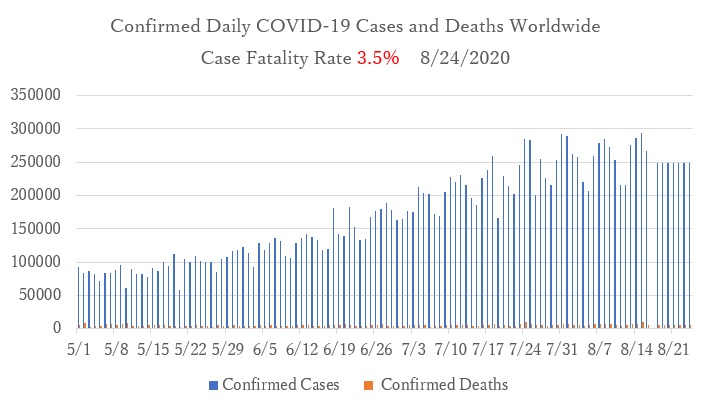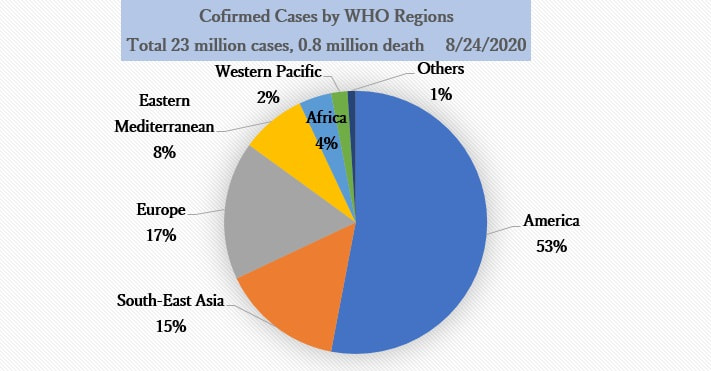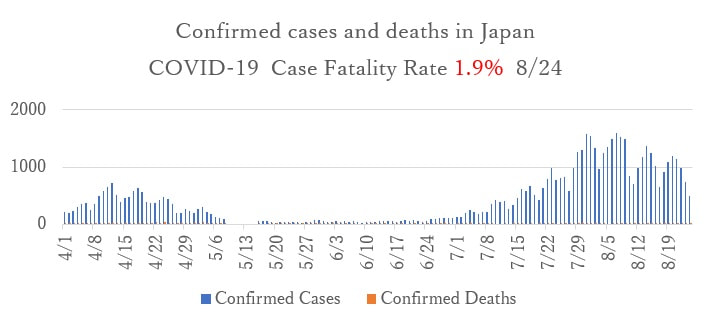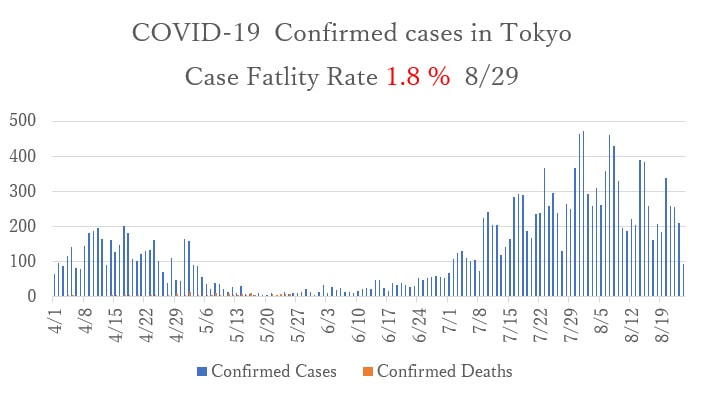SHARE
Services for the Health in Asian & African Regions (SHARE) = SHARE is a citizen sector organization (NGO) that engages in international cooperation mainly through providing health service.
HOME > News > Information of COVID-19(10)
- 【※updated】COVID-19(multi-language)
- Information of COVID-19(15)
- Information of COVID-19(vaccines)
- 《Request to the Government of Japan》Ease the protection of intellectual property rights and promote sharing and cooperating on pharmaceuticals and medical technologies, in order to accelerate efforts to overcome COVID-19 all over the world.
- Information of COVID-19(14)
- Information of COVID-19(13)
- Information of COVID-19(12)
- Information of COVID-19(11)
- SHARE Medical Information Line for Migrants is resumed in Oct.
- Information of COVID-19(10)
Information of COVID-19(10)

Information of COVID-19 (10)by SHARE 2020.09.03
1.Global and Japanese Situation of COVID-19
Confirmed cases of COVID-19 worldwide according to reports by WHO Update 8/24/2020 (Japan Standard Time) :

The number of daily new cases worldwide, which had been on the rise following the explosion of infections in the Americas, India and South Africa, peaked in mid-August 2020 and is following a downward trend. The cumulative number of positive cases totaled 23 million and there are more than 800,000 total dealths. The regional distribution of positive cases is as follows: the United States, Brazil and other regions of the Americas (54.5%); Southwest Asia, India and other regions of Southwest Asia (15.2%); Europe, where many countries have experienced outbreaks (17.2%); South Africa and other parts of Africa (8.8%); the Middle East, where medium-sized infections continue to occur (4.4%); Western Pacific region, where holding off the increase of infection (2.2%). The fatality rate among positive cases decreased from 6.9% in April to 3.5% in August.

The number of daily new cases in Japan was decreasing after the state of emergency had been declared in April and May. However, in July the spread of infection in Tokyo and other urban areas began again. Infections then increased nationwide, resulting in a so-called second wave of infection. The epidemic again peaked in late July/early August and has declined since late August. The trend in the number of daily positive cases in Tokyo is similar to that in Japan as a whole.

2.The Future of the COVID-19 Epidemic in Japan
In Japan, the public mostly complied with the policy of voluntary curfews following the declaration of the state of emergency in April. As a result, the nationwide curfew was successful and infections were temporarily under control. The second wave of outbreaks began in July in response to the "Go To Campaign", a governmental measure to stimulate consumption to support industries that have suffered a sharp decline in sales due to COVID-19 restrictions, such as tourism and entertainment. The second wave has been better controlled due to preventive measures taken by each municipality. However the epidemic is expected to continue in the future. The reasons for this are as follows:- According to the results of antibody tests conducted by the Ministry of Health, Labour and Welfare (MHLW) in June on 7,950 people, only a small number of residents had been infected with COVID-19 (0.10% in Tokyo, 0.17% in Osaka, and 0.03% in Miyagi Prefecture), therefore most people do not have immunity to the virus. Exposure to SARS-CoV-2 in places like the 3Cs (Closed spaces, Crowded spaces, Close-contact settings) is highly likely to result in viral transmission. With the current expansion of economic activity and inevitable contact between people, the risk of infection from asymptomatic or mildly ill individuals is unavoidable. Also, as a result of contact outside of the household, infection may occur in one's household without members being aware of it.
- It is difficult for the government to take any further policy measures at the expense of the economic stability. Even if there is an outbreak in the future, as long as the medical supply system is in place to deal with infections, it is unlikely that another state of emergency will be declared, like in April. The country is expected to adopt policies for economic recovery.
- In the world, in countries where the number of positive cases has increased by more than 1,000 due to previous outbreaks of community-acquired infections (e.g., Iran, European countries, Indonesia), the epidemic has not ended and the number of positive cases has remained above 500-1000 for more than four months. Japan is also expected to continue to have a daily number of about 500-1000 positive cases.
- In order to contain the COVID-19 epidemic, effective vaccines, which are being developed around the world, must be administered to the population. It is expected that it will take at least two years to develop a vaccine without significant side-effects and produce enough of it to inoculate the world population.
3.Exemption from COVID-19 Inspection Fees in Japan by Installing the COCOA application
- The COCOA Contact Confirmation App is a smartphone application that allows users to receive notifications about possible contact with a COVID-19 infected person. It is a tool that uses the proximity communication function (Bluetooth) of a smartphone, with the consent of the user, to deliver notifications about possible contact with a COVID-19 positive person.. By using a smartphone's Bluetooth, contact is confirmed without either party knowing each other so that their privacy is ensured.
- On August 21, the Ministry of Health, Labour and Welfare (MHLW) indicated that COCOA users who have been notified by the MHLW that they may have been in contact with a COVID-19-positive person will also be subject to administrative testing and will not be asked to bear the cost of the testing (i.e., will be paid by the government).
- If a patient's health status deteriorates within 2 weeks of their test, the patient is required to report it immediately via COCOA. That time the patient should be promptly retested.
- It should be noted that the test cannot be used to prove the patient is virus negative.
https://gemmed.ghc-j.com/?p=35627
https://www.mhlw.go.jp/stf/seisakunitsuite/bunya/cocoa_00138.html
4.Support Available to Foreign Residents of Japan
1)Special Cash Payment Plan- Foreign nationals whose names were recorded in the Basic Resident Register as of April 27, the reference date, will be eligible for these benefits.
- On May 19 it was announced that (former) technical intern trainees and (former) foreign students who have difficulty returning to their home countries, as well as children of refugee claimants, would also be eligible for the special cash payment plan. Technical intern trainees and international students with "Temporary Visitor" or "Designated Activities (three months)" status will need to apply for permission to change their status of residence to "Designated Activities (six months)" and register their status with the Basic Resident Register.
- The application deadline has passed in most local governments, but in some cases, it has not yet been closed.
- Applicants can apply by filling in their bank account information on the application form mailed by the municipality to the recipient. The form must be mailed back to the municipality together with documents confirming the bank account and copies of personal identification documents. Alternatively, holders of a "My Number Card" (individual number cards for social security and tax number system) can apply electronically by entering the payee account on "Myna Portal" (government online service site) and uploading the appropriate confirmation documents for the payee account.
https://migrants.jp/news/office/20200520.html(Ijyuuren: Solidarity Network with Migrants Japan)
https://kyufukin.soumu.go.jp/ja-JP/cities/application_deadline.html (Application deadlines for each municipality)
2)Temporary Special Benefit for Households with Children
- Households that are registered with the Basic Resident Register and receive a child allowance (households with children aged 0 to junior high school students) will be paid 10,000 yen per eligible child. No application is required and the allowance is paid automatically.
- A family who has a "Student" visa holder and has (an) eligible child/children who have a "Dependent" visa status is also eligible to receive the benefit.
https://www8.cao.go.jp/shoushi/shinseido/taiou_coronavirus.html
3)Temporary Loan Emergency Funds(mainly for households with income shortage)
- A maximum of 200,000 yen will be loaned to households that are affected by COVID-19 restrictions, have experienced a decrease in income due to absence from work, etc., and require emergency and temporary living expenses to maintain their lives.
https://www.tcsw.tvac.or.jp/
Written by Nakasa T, MD, Co-President of SHARE
Dr. Aya Yumino
Dr. Aya Yumino
■【Release】Information of COVID-19(ENGLISH)
■Useful URLs by multi-languages




